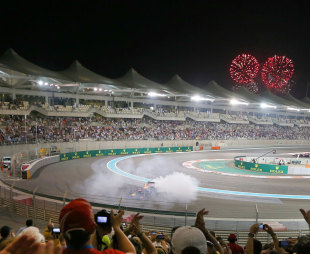
Formula One took a bit of a battering towards the end of the 2013 season as Sebastian Vettel romped towards his fourth world title. Casual viewers dropped away as the races became more predictable and, eventually, entirely one-sided. F1 had become boring again.
The news that next year's season finale will be worth double points is an attempt to manufacturer more excitement for longer. This year it would have made no difference to the result as Vettel would still have been crowned champion in India, but it's easy to see how it could help build the drama in the second half of a season.
However, while it's true that F1 is in competition with other sports to attract viewers every other Sunday, skewing the championship is not a satisfactory answer. Imagine if a driver builds up a 49-point lead over the course of 18 races by taking hard-fought victories, only to lose the title at the final race due to a first-lap accident out of his control. Would the right driver be crowned champion?
Teams fighting for lower places in the standings will also be affected. A freak result for a midfield team at the final race, again through luck rather than judgement, could undo a season of hard work and genuine achievement for a rival. On-track incidents will have double the impact on the standings, yet will be subject to the same penalties as they are at every other race. In short, it's a knee-jerk reaction that could lead to unfair results.
A similar response came in 2003 after three consecutive titles for Michael Schumacher. The points system was changed to reduce the gap between coming first and second, only for the points biasing to be overhauled again in 2010 to put the emphasis back on winning races. In theory if the double points rule proves unpopular it could also be reversed, but there is a commercial angle to it that means it is likely to stay.
The rule makes the final slot on the calendar all the more appealing to race organisers, meaning venues with bigger budgets, such as Abu Dhabi which will host the final race next year, will be keen to negotiate their way onto the final slot. That should mean more money comes into Formula One's coffers, but it also has a downside. The most thrilling season finales in recent years have come in Brazil, but if the slot becomes reserved for the highest bidder then Interlagos is unlikely to stump up the cash. If Abu Dhabi becomes a mainstay at the end of the calendar, you can also forget the chance of rain adding extra excitement to the final race.
Ultimately, double points at the final race is another artificial mechanism to make F1 more exciting to casual fans. It is likely to work at times over the coming years, building the anticipation ahead of the season finale, but in doing so it will skew the result for those that have been watching and competing all year.
Laurence Edmondson is deputy editor of ESPNF1
© ESPN Sports Media Ltd.
 Laurence Edmondson is deputy editor of ESPNF1 Laurence Edmondson grew up on a Sunday afternoon diet of Ayrton Senna and Nigel Mansell and first stepped in the paddock as a Bridgestone competition finalist in 2005. He worked for ITV-F1 after graduating from university and has been ESPNF1's deputy editor since 2010
Laurence Edmondson is deputy editor of ESPNF1 Laurence Edmondson grew up on a Sunday afternoon diet of Ayrton Senna and Nigel Mansell and first stepped in the paddock as a Bridgestone competition finalist in 2005. He worked for ITV-F1 after graduating from university and has been ESPNF1's deputy editor since 2010

